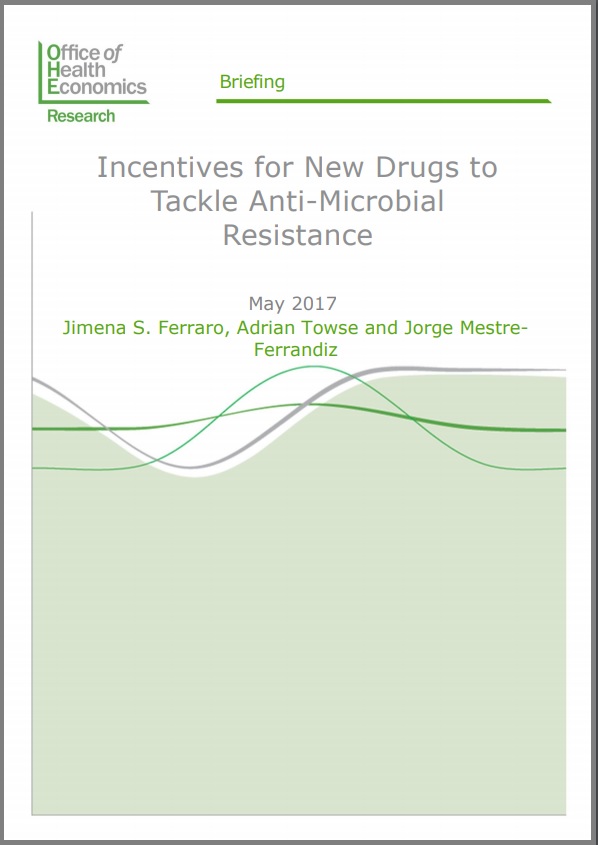Sign up to our newsletter Subscribe
Incentives for New Drugs to Tackle Anti-Microbial Resistance

ISPOR’s 19th Annual European Congress is scheduled for 29 October – 2 November 2016 in Vienna. This post contains a summary of the contributions by various members of the OHE team.
ISPOR’s 19th Annual European Congress is scheduled for 29 October – 2 November 2016 in Vienna. This post contains a summary of the contributions by members of the OHE team. Individual contact details can be found through the links below or via our Meet the Team webpage if you would like any further information.
Short course: Risk-Sharing / Performance-Based Arrangements for Drugs and Other Medical Products. Sunday, 8:00-12:00, Hall F1 (L0), pre-registration is required.
Course tutors: Lou Garrison (University of Washington and OHE), Adrian Towse (OHE), Paolo Daniele Siviero (Principia III).
There is significant and growing interest among both the payers and producers of medical products for arrangements that involve a “pay-for-performance” or “risk-sharing” element. Issues surrounding theory and practice, including incentives and barriers, will be analysed along with several examples of performance-based schemes from Europe, the United States, and Australia. A hypothetical case study will be used in an interactive session to illustrate a systematic approach to weighing their applicability and feasibility.
Short course: Using Multi-Criteria Decision Analysis in Health Care Decision Making: Approaches & Applications. Sunday, 13:00-17:00, Hall F2 (L0), pre-registration is required.
Course tutors: Maarten IJzerman (University of Twente), Nancy Devlin (OHE), Martina Garau (OHE).
This course reviews the current multi-criteria decision analysis (MCDA) landscape, including a review of MCDA studies in health care and the different approaches employed. Best practices for conducting MCDA will also be outlined, as well as issues related to selecting the right data approach. Steps involved in conducting MCDA (such as criteria definition, scoring performance, weighting criteria, and uncertainty analysis), and current and future applications in health care decision making will be discussed. The presenters will draw from a number of real world examples and will reference the ISPOR Good Practice Guidelines for MCDA.
Plenary session: Differential Pricing of Medicines in Europe: Implications for Access, Innovation, and Affordability. Tuesday, 10:15-12:00, Hall A (L2).
Moderator: Lou Garrison (University of Washington and OHE).
Speakers: Adrian Towse (OHE), Sabine Vogler (Austrian Public Health Institute), Jo De Cock (National Institute of Health and Disability Insurance), Elias Mossialos (LSE).
This plenary session will explore options for a defined and systematic approach to promoting efficient differential pricing in Europe. Operational and political feasibility are key considerations in moving toward a sustainable policy.
Poster: A New Approach to Presenting Health States in Stated Preference Valuation Studies. Monday, displayed 8:45-14:15, author discussion hour: 13:15–14:15, D37.
Authors: Amanda Cole (OHE), Koonal Shah (OHE), Brendan Mulhern (University of Technology Sydney), Yan Feng (OHE), Nancy Devlin (OHE).
This study tests the impact of changing the presentation of health states in valuation studies, using the EQ-5D-5L. We conducted a two-arm discrete choice experiment (DCE) comparing the standard presentation of health states versus presenting them ‘in context’ of the entire descriptive system, finding that the ‘in context’ display led to fewer logical inconsistencies in responses and greater differentiation between the valuations of different levels of a health problem.
Presentation: Modelling the Impact of Reform to the Cancer Drugs Fund. Tuesday, 15:15-15:30, Hall F2 (L0).
Authors: Sarah Britton (Karlsberg Schaffer) (OHE), Martina Garau (OHE), Phill O’Neill (OHE) and Simona Bianchi (ABPI).
The Cancer Drugs Fund (CDF) was created in 2010 to pay for oncology indications that were not approved by the National Institute for Health and Care Excellence (NICE) and were not routinely available within the NHS in England. After a consultation process, it was agreed that from July 2016, NICE will appraise all new licenced cancer indications and decide whether they are eligible for inclusion in the CDF, which will become a ‘managed access fund’. This research estimates the number of current CDF indications that may be eligible for the new CDF following its reform.
Issues panel: Is Balancing Value Demonstration for Payer and Patient Interests a Feasible Notion? Wednesday, 8:45-9:45, Hall E1 (L0).
Moderator: Kathleen Hughes (Avalere Health LLC).
Panellists: Adrian Towse (OHE), Sachin Kamal-Bahl (Pfizer), Alastair Kent (Genetic Alliance UK).
Maintaining patient focus in healthcare decision-making is a universally-accepted approach to ensuring positive outcomes. During this session panellists will debate how addressing payer and patient interests simultaneously could impact research functions, including broader evidence generation, patient-reported outcomes development, and establishment of quality measures encompassing payer/patient perspectives.
Issues panel: Can We Really Compare and Aggregate Patient-Reported Outcome Data Between People and Settings? Implications for Clinical Trials and Health Technology Assessment. Wednesday, 10:00-11:00, Hall A (L2).
Moderator: Nancy Devlin (OHE).
Panellists: Mike Herdman (OHE), Paula Lorgelly (OHE), Andrea Manca (University of York).
Patient-reported outcomes (PROs) are routinely collected in clinical trials, cohort studies and population health surveys. They are used to compare health across heterogeneous populations, e.g. across countries, different cultural settings and socio-demographic groups. This panel looks at whether PRO data are truly comparable across different groups of individuals and the implications of ignoring heterogeneity.